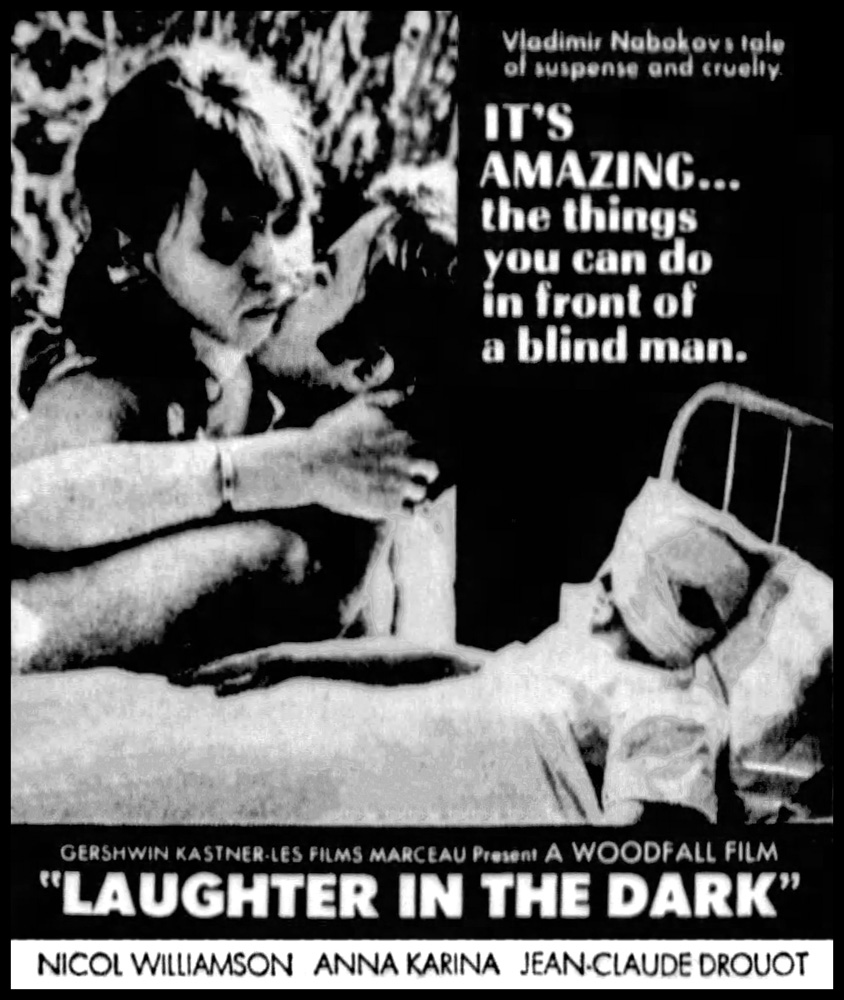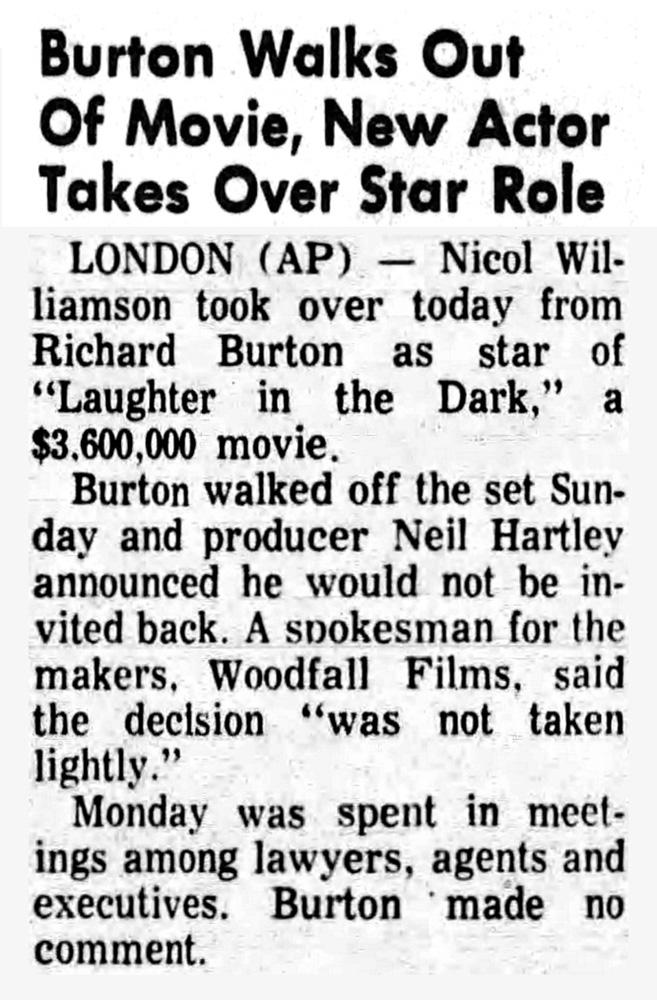|
LAUGHTER IN THE DARK (1969).
 A mild-mannered married man upends his luxurious but irritatingly sedate world in the pursuit of unchecked desire in this British adaptation of Vladimir Nabokov's early novel, courtesy of director Tony Richardson, who'd won an Oscar six years earlier for TOM JONES and quickly squandered that mainstream goodwill with uncommercial follow-ups like this, THE LOVED ONE and the Jean Genet-based MADEMOISELLE. It also features another colorful role for Nicol Williamson, taking over the lead role after Richard Burton (who'd earlier teamed with Richardson for 1959's LOOK BACK IN ANGER) was publicly fired two weeks into filming, following a fight with the director for arriving on the set six hours late... Williamson stars as Sir Edward More, a prestigious London art dealer with a classy wife (Siàn Phillips, from I, CLAUDIUS) and darling young daughter (eight-year-old Kate O'Toole, daughter of Peter O'Toole and Siàn Phillips, in her screen debut). Bored of cocktail parties, art auctions and separate twin beds, Edward sneaks off to the cinema and finds himself instantly obsessed with pretty theatre usherette Margot (French New Wave icon Anna Karina). Though initially reluctant when approached by this odd, smitten stranger, her attitude changes after getting a gander at his chauffeured limo. Despite not knowing a damned thing about Margot, Edward is convinced that he's madly in love, and she's content to toss a spanner into this fool's life by barging into his workplace and home, conning him into buying her a flat, "accidentally" sending an intimate telegram to his house, and (after his family has left him) decorating More's upper-crust manor with mod inflatable furniture and throwing a groovy "happening" (with longtime Ken Russell cinematographer Dick Bush pulling out every stop). Capricious Margot also convinces Edward to hire ex-lover Herve (Jean-Claude Drouot) as his assistant, claiming that the handsome guy is gay, as the two continually screw behind this oblivious nebbish's back. The final half-hour,
A mild-mannered married man upends his luxurious but irritatingly sedate world in the pursuit of unchecked desire in this British adaptation of Vladimir Nabokov's early novel, courtesy of director Tony Richardson, who'd won an Oscar six years earlier for TOM JONES and quickly squandered that mainstream goodwill with uncommercial follow-ups like this, THE LOVED ONE and the Jean Genet-based MADEMOISELLE. It also features another colorful role for Nicol Williamson, taking over the lead role after Richard Burton (who'd earlier teamed with Richardson for 1959's LOOK BACK IN ANGER) was publicly fired two weeks into filming, following a fight with the director for arriving on the set six hours late... Williamson stars as Sir Edward More, a prestigious London art dealer with a classy wife (Siàn Phillips, from I, CLAUDIUS) and darling young daughter (eight-year-old Kate O'Toole, daughter of Peter O'Toole and Siàn Phillips, in her screen debut). Bored of cocktail parties, art auctions and separate twin beds, Edward sneaks off to the cinema and finds himself instantly obsessed with pretty theatre usherette Margot (French New Wave icon Anna Karina). Though initially reluctant when approached by this odd, smitten stranger, her attitude changes after getting a gander at his chauffeured limo. Despite not knowing a damned thing about Margot, Edward is convinced that he's madly in love, and she's content to toss a spanner into this fool's life by barging into his workplace and home, conning him into buying her a flat, "accidentally" sending an intimate telegram to his house, and (after his family has left him) decorating More's upper-crust manor with mod inflatable furniture and throwing a groovy "happening" (with longtime Ken Russell cinematographer Dick Bush pulling out every stop). Capricious Margot also convinces Edward to hire ex-lover Herve (Jean-Claude Drouot) as his assistant, claiming that the handsome guy is gay, as the two continually screw behind this oblivious nebbish's back. The final half-hour,  after Edward goes blind following an auto accident, is particularly mean-spirited, with caretaker Margot sadistically mocking and abusing him, Herve secretly sharing the couple's new seaside home and disaster looming on the horizon... Working from a script by Edward Bond (WALKABOUT), Richardson maintains an uncomfortably dark-humored tone throughout, which occasionally curdles into downright cruelty. One crucial change from Nabokov's original work is that instead of its relationship being between a middle-aged man and a sixteen-year-old girl, the film's stars are only separated by four years, which makes Margot's behavior more heartlessly money-grubbing than callously immature. Consistently acclaimed yet never achieving the fame that his talent warranted, Williamson (who was paid only one-thirtieth of Burton's original salary!) often played troubled yet larger than life characters -- Hamlet, Sherlock Holmes, Macbeth, Merlin -- but lovesick doormat Edward is an altogether different role for him. While it's hard to feel much compassion for this groveling, gullible cuckold, Nicol's unique acting choices keeps us intrigued nonetheless. He's well matched by Karina's doe-eyed, manipulative minx, though Drouot (star of the French, Robin Hood-esque TV-series THIERRY LA FRONDE) is little more than a bland Alain Delon wannabe. after Edward goes blind following an auto accident, is particularly mean-spirited, with caretaker Margot sadistically mocking and abusing him, Herve secretly sharing the couple's new seaside home and disaster looming on the horizon... Working from a script by Edward Bond (WALKABOUT), Richardson maintains an uncomfortably dark-humored tone throughout, which occasionally curdles into downright cruelty. One crucial change from Nabokov's original work is that instead of its relationship being between a middle-aged man and a sixteen-year-old girl, the film's stars are only separated by four years, which makes Margot's behavior more heartlessly money-grubbing than callously immature. Consistently acclaimed yet never achieving the fame that his talent warranted, Williamson (who was paid only one-thirtieth of Burton's original salary!) often played troubled yet larger than life characters -- Hamlet, Sherlock Holmes, Macbeth, Merlin -- but lovesick doormat Edward is an altogether different role for him. While it's hard to feel much compassion for this groveling, gullible cuckold, Nicol's unique acting choices keeps us intrigued nonetheless. He's well matched by Karina's doe-eyed, manipulative minx, though Drouot (star of the French, Robin Hood-esque TV-series THIERRY LA FRONDE) is little more than a bland Alain Delon wannabe.
© 2017 by Steven Puchalski.
 
|